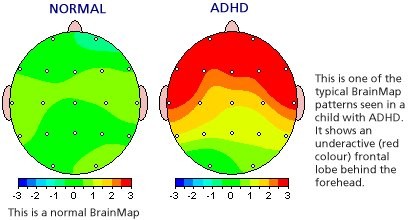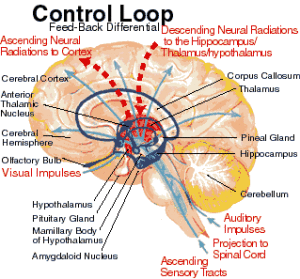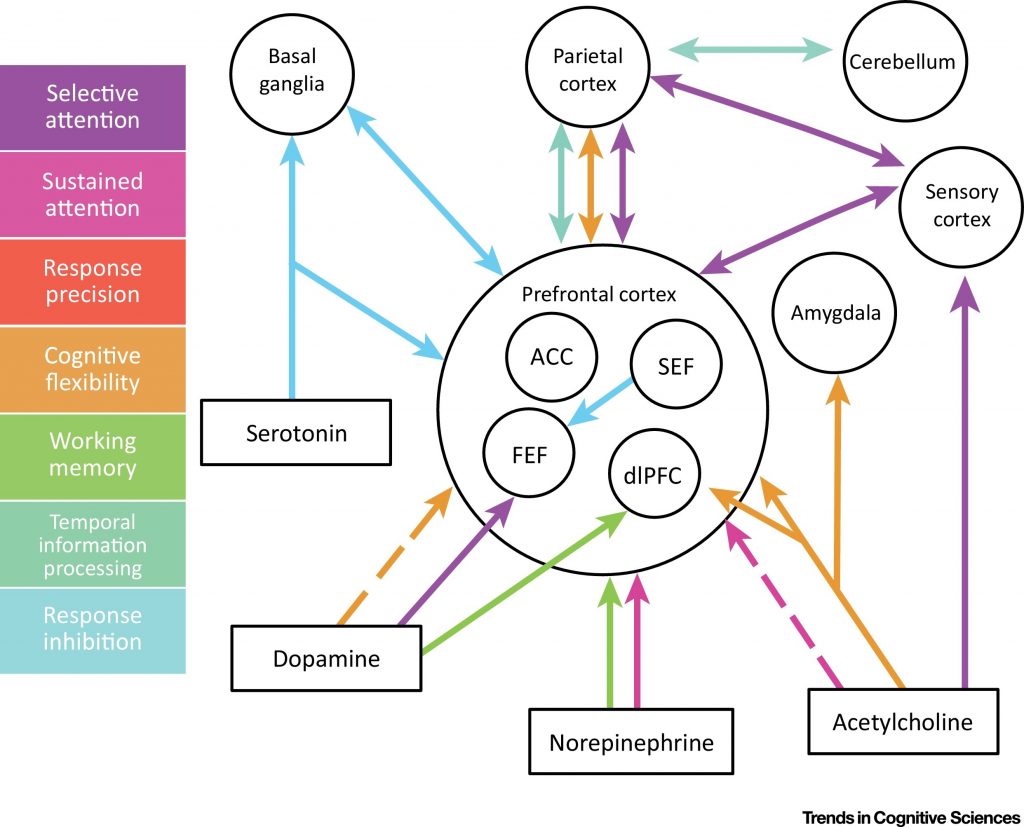6.1.5 ADD/ADHD
What is ADD / ADHD?

Inability to focus the attention.
Attention Deficit Disorder or Attention Deficit and Hyperactivity Disorder is a neuro-processing problem which affects attention and learning ability. It is believed to be a disorder in the transmission system which
relays messages between cells in various parts of the brain.
This means that the child (or adult) cannot focus on the sounds they want to hear and tune out other distractions. This in turn leads to the inability to concentrate their attention on a selected topic for any length of time.
Poor functioning of the frontal lobe means the child cannot think quickly enough to “put the brakes on” and control the impulse to act. This impulsiveness and hyperactivity also leads to behavioural problems and poor social skills.

ADHD is believed to be a disorder of the brain’s neurotransmitter chemicals, noradrenaline and dopamine. However, the standard way of diagnosing the condition is by assessing the child on a number of behavioural standards. These behaviours relate to the ability of the child to focus attention and to use judgement and inhibition. This assessment is usually done by a paediatrician or a psychiatrist. Since it is simply a matter of ticking off a number of criteria on a list, the diagnosis really marks an arbitrary point where the experts say, ‘this child has enough problems that we will call it ADHD’.
Some children with ADD are vague and dreamy. Others are hyperactive.
Historically, ADD indicated the vague and dreamy state, whereas ADHD indicated the hyperactive state.
The condition is now defined as ADHD “predominantly inattentive” or “predominantly hyperactive.”
Symptoms which contribute to the diagnosis of ADHD include, on the inattentive side, such things as:
- Inattentiveness
- Not seeming to listen
- Not following instructions or completing work
- Avoiding sustained mental effort
- Losing things
- Being easily distracted and forgetful
And on the hyperactive side:

- Fidgeting and squirming
- Moving around at inappropriate times
- Unable to engage in quiet activities
- Frequently on the go
- Talking excessively
- Unable to take turns
- Interrupting or intruding
There must be evidence that these symptoms interfere with or reduce the quality of social, academic or occupational functioning.
How does Sound Therapy help with attention deficit/ hyperactivity disorder (ADD/ADHD)?

It retrains the ability to focus the attention and delay reactions long enough to make a more considered decision.
Sound Therapy retrains the focusing ability of the ear and streamlines the brain’s ability to process sound.
Once the child is able to focus on the desired sound and relay the information directly to the language centre in the brain, concentration and learning become much easier. The child is no longer distracted by all the sounds around and is able to focus and learn. The child is much calmer, self-esteem improves and so does behaviour.
Studies have recorded observed improvements in many different behaviours of ADHD children as a result of Tomatis Sound Therapy. The observed improvements were in areas such as listening and speech, academic achievement, attention, behaviour, movement, sports and rhythm, ability to relax, creativity and academic skills.

As listening discrimination is re-trained, memory and concentration improve. Learning can then be achieved with a great deal less effort. Sleep and appetite problems are resolved as the whole system becomes calmer and less erratic. The behavioural difficulties, such as impulsiveness and aggression are now brought down to a manageable level. The child will then be more able to pay attention in class, understand and follow instructions and be motivated to communicate and learn.
Due to the variety of ADHD symptoms it is difficult to measure all responses to Sound Therapy in a single group. Some children’s brains are under-active whilst others are over-active. Therefore some need better focus and more brain activity, while others need to be calmer and reduce over-activity of the brain.
Sound Therapy assists in both of these areas, affecting children differently, depending on the type of brain malfunction they are experiencing. For this reason, the best analysis of results from ADHD children so far has been through observations by parents and teachers on their improved behaviour and performance, rather than through objective measures such as qEEGs.
When we compare these results to the accounts of adults who are able to articulate their experience, it seems that Sound Therapy helps to bring the brain back to balance, enabling calm relaxation or energetic arousal, as needed.
Oppositional Defiance Disorder, or ODD, is a behaviour pattern where the child constantly says ‘no’, stubbornly refuses to co-operate with requests and intentionally breaks rules. You would have to meet and spend time with one of these children to understand that this is more than the ‘terrible two’s’, and is not due to poor parenting. Their common behaviours include:
- Losing temper
- Arguing with adults
- Refusing adult requests or defying rules
- Deliberately annoying other people
- Blaming others for his or her own mistakes
- Touchy or easily annoyed
- Angry and resentful
- Spiteful or vindictive

This syndrome puts excessive strain on families, even beyond that normally experienced with ADHD children. There is a greater likelihood that these families will experience marital problems and other emotional problems.
Sound Therapy has helped some children who have difficulty controlling their angry outbursts, so could likely be of benefit to a child with ODD.

